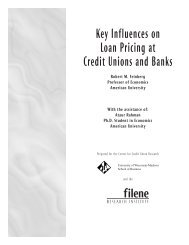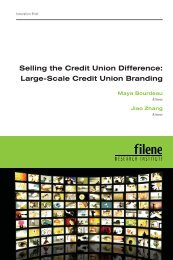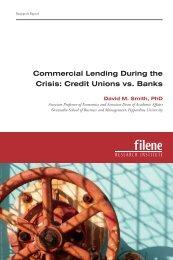Credit Union and Cooperative Patronage Refunds - Filene ...
Credit Union and Cooperative Patronage Refunds - Filene ...
Credit Union and Cooperative Patronage Refunds - Filene ...
You also want an ePaper? Increase the reach of your titles
YUMPU automatically turns print PDFs into web optimized ePapers that Google loves.
to low interest rates, credit union members would hold similar<br />
preferences for the payment of annual patronage refunds.<br />
• There is something about consistent patronage refunds that<br />
matures the cooperative in the eyes of its members. It’s like the<br />
co-op has confidence in its membership <strong>and</strong> in its viability. The<br />
co-op is serious about financial success <strong>and</strong> wants to provide<br />
the goods <strong>and</strong> services that will make it profitable.<br />
• We think that co-ops that make money <strong>and</strong> pay patronage<br />
refunds are more likely to survive <strong>and</strong> flourish as businesses than<br />
co-ops that do not have the same emphasis on profitability or<br />
accountability to members.<br />
• Co-ops have a story to tell, particularly when they pay patronage<br />
refunds. The members of the American Bankers Association<br />
(ABA) would never willingly operate with the deep member<br />
involvement that is encouraged under co-op principles. The<br />
relevant audience of an IOF bank is limited to its common<br />
stockholders, whereas the relevant audience of a co-op is all of its<br />
customers or members. IOF banks do not subject their capital<br />
plans to customer scrutiny or think it necessary to explain to<br />
customers why the bank was investing in growth rather than in<br />
equity redemptions, why the firm did not pay a patronage refund,<br />
why the patronage refund decreased in size, or why that product<br />
or this service could not be provided at a lower overall price.<br />
• IOF banks would never accept as one of their primary objectives<br />
the return of surplus capital to customers. The inclination of IOF<br />
banks is to hoard <strong>and</strong> use capital rather than return it. Co-ops are<br />
not as glitzy as IOF banks. The discipline that management must<br />
execute <strong>and</strong> the leadership required of a co-op is more onerous<br />
than that needed for an IOF. But the rewards—the intangibles—<br />
of affiliating oneself with an organization that is operated for the<br />
benefit of its members rather than the organization’s own pocketbook<br />
are immensely rewarding. We heard as much from Prunty,<br />
Hanson, <strong>and</strong> Mislansky in our interviews for this report.<br />
• Timing is everything. With the Basel capital requirements <strong>and</strong><br />
the state of the economy, boards of directors <strong>and</strong> management<br />
must make educated, wise decisions about when to implement a<br />
patronage refund program.<br />
Similar to the experience of rural electric cooperatives, the more that<br />
regulators <strong>and</strong> investor- owned competitors see that the cooperative’s<br />
membership is vibrant, informed, <strong>and</strong> supportive of the credit union,<br />
the more difficult it is for the tax exemption to be attacked.<br />
57








